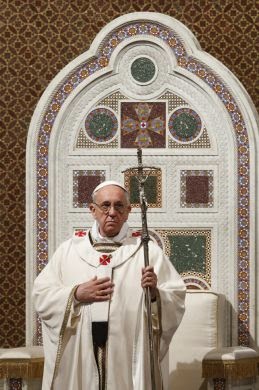The infallibility of the pope does not stand alone. His infallibility is rooted in the infallibility of the church, and to start with we have to understand what infallibility is.
It is a negative definition. It doesn’t cover everything. Infallibility is not the last word, it is the next word. Infallibility means what is taught is without error, but it doesn’t say that what is taught is necessarily the complete and final truth of a matter, nor does the teaching cover every aspect of the subject being taught. Infallible definitions are, by their nature, limited in their scope. This is ironic since we often think of infallibility as this heaven above, universal power of the pope and the church. No. Think of it as a bulwark not a blanket. It defines and defends a particular truth–it does not give encyclopedic definitive teaching about that subject.
The infallibility of the Catholic Church is based on the infallibility of Christ. The Catechism says that Christ “grants a measure of his infallibility to his Church.” This is seen in the New Testament very clearly. First of all we see time and again throughout the gospels that Jesus is a man of authority. He teaches as “one with authority” the people are “amazed at his authority” to show that he “has authority to forgive sins” he heals the paralytic. He says it most clearly Mt. 28:18 that “all authority on heaven and earth has been given to him from his father.” The epistles corroborate this for Christ is given all authority. Before him every knee shall bow and every tongue confess. He preaches with authority and preaches without error.
Then in the gospels time and again Jesus calls the twelve and “gives them authority” to heal the sick and preach the gospel and overcome evil. He says, “As the father has sent me I am sending you.” In Matthew 28 after he says, “All authority in heaven and earth has been given to me.” he goes on, “Therefore go and make disciples of all nations,baptizing them in the name of the Father and of the Son and of the Holy Spirit, and teaching them to obey everything I have commanded you. And surely I am with you always, to the very end of the age.”
This passage, along with the others in which Jesus promises the Holy Spirit “which will teach them all things” for “they cannot know everything now” indicates that the apostles bear the authority of Christ not only to preach the gospel and baptize in the name (and therefore the authority of) of the Holy Trinity, but to teach the truth and obey Christ’s teachings. The fact that he promises to be with them to the end of the age indicates that this authority will continue after the death of the apostles.
A quick read of the rest of the New Testament will confirm that the apostles considered their teaching to be directly from God, and not of their own invention. Time and again St Paul says to his hearers words to the effect, “I speak as an apostle of Jesus Christ. These are not my words, but the teachings of Christ himself.”
This is a supernatural promise that through the Holy Spirit Christ’s own divine authority will be perpetrated in witness and teachings of the apostles (and by logical extension) to their successors. How could that supernatural teaching be allowed to contain error? If it is from Christ it must be infallible. This is why the Catechism teaches that Christ grants a measure of his own infallibility to the Church. He does so as he grants his apostles the authority to teach the truth from God.The definition of infallibility according to my quotation of the catechism in the earlier post matches this perfectly. The infallibility of the Catholic Church is simply the promise that what she teaches in the matters of faith and morals is without error. In other words, it is what the Holy Spirit has revealed for the salvation of mankind.
What remains, therefore, is for anyone who understands the fullness of historic Christian doctrine and teaching on morality to show where, any time in history the formal teaching of the Catholic Church has erred. If that teaching has strayed into heresy or immorality, then the dogma of infallibility must be wrong. If, however, it cannot be shown that the formal teaching of the Catholic Church has erred, then we can rightly assume that the dogma of infallibility is tenable and reasonable.
Of course it can be shown that Catholics have sinned. Catholics have been hypocrites–terrible hypocrites. Wrong judgements and mistakes have been made in the areas of politics, arts, sciences or learning by individual Catholics–bishops and popes included. This is not what we mean by infallibility. It must be shown that in the formal, written teachings of the church (not just particular theologians or bishops) there is immorality or doctrinal heresy taught.
I have not heard of one instance where this can be shown.
However, when we consider other Christian sects and denominations multiple examples of error can be found. These errors are not just errors when compared to Catholic teaching–that would be an in internal and exclusive definition: i.e. “What my church teaches is true therefore what you teach must automatically be untrue.”
No, the error within other churches is often formal error which does not simply contradict the fullness of Catholic teaching down the ages, but it contradicts Divine Revelation in Scripture, common sense and natural law.







In matters of faith and morals, infallibility is important. I believe the Nicene Creed is infallible. The Pope is Christ’s Vicar on earth and is guided by the Holy Spirit in many ways to teach the infallible Truth.
But is every written pronouncement from the Pope infallible? If not, what are the hallmarks of an infallible statement?
Is every Encyclical infallible? Apostolic Letter? Exhortation? Other types of written documents?